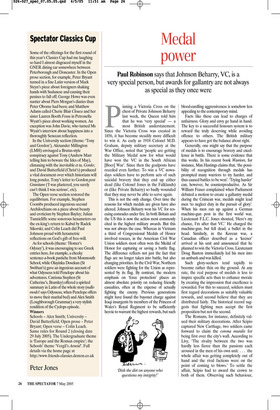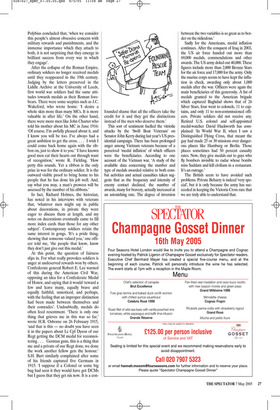Medal power
Paul Robinson says that Johnson Beharry, VC, is a very special person, but awards for gallantry are not always as special as they once were Pinning a Victoria Cross on the chest of Private Johnson Beharry last week, the Queen told him that he was ‘very special’ — a most British understatement. Since the Victoria Cross was created in 1856, it has become steadily more difficult to win it. As early as 1918 Colonel M.D. Graham, deputy military secretary at the War Office, noted that ‘people are getting the Military Medal now for what would have won the VC in the South African [Boer] War’. Since then the goalposts have receded even further. To win a VC nowadays soldiers have to perform acts of such suicidal bravery that they end up either dead (like Colonel Jones in the Falklands) or (like Private Beharry) so badly wounded that they may never be able to serve again.
This is not the only change. Over time the reasons for which medals are given have also altered. Johnson Beharry won his VC for rescuing comrades under fire. In both Britain and the US this is now the action most commonly cited in the highest military awards. But this was not always the case. Whereas in Vietnam a third of Congressional Medals of Honor involved rescues, in the American Civil War Union soldiers most often won the Medal of Honor for capturing or saving a battle flag. The difference reflects not just the fact that flags are no longer taken into battle, but also changing priorities. In the Civil War, Northern soldiers were fighting for the Union as represented by its flag. By contrast, the modern emphasis on ‘force protection’ places an almost absolute priority on reducing friendly casualties, often at the expense of actually fighting the enemy. Previous generations might have found the bayonet charge against Iraqi insurgents by members of the Princess of Wales’s Royal Regiment to be sufficiently heroic to warrant the highest rewards, but such blood-curdling aggressiveness is somehow less appealing to the contemporary mind.
Facts like these can lead to charges of unfairness. Glory and envy go hand in hand. The key to a successful honours system is to reward the truly deserving while avoiding offence to others. The British military appears to have got the balance about right.
Generally, one might say that the purpose of medals is to encourage bravery and excellence in battle. There is some evidence that this works. In his recent book Warriors, for instance, Max Hastings claims that, ‘the possibility of recognition through medals has prompted many warriors to try harder, and thus caused battles to be won’. ‘Trying harder’ can, however, be counterproductive. As Sir William Fraser complained when Parliament debated a motion to create a gallantry medal during the Crimean war, medals might lead men ‘to neglect duty in the pursuit of glory’. When his men ran up against a German machine-gun post in the first world war, Lieutenant F.L.C. Jones shouted, ‘Here’s my chance, I’m after that VC.’ He charged the machine-gun, but fell dead, a bullet in the head. Similarly, in the Korean war, a Canadian officer described as a ‘keener’ arrived at his unit and announced that he planned to win the Victoria Cross. Lieutenant Doug Banton immediately led his men into an ambush and was killed.
Such glory-seekers tend rapidly to become rather thin on the ground. At any rate, the real purpose of medals is less to inspire specific acts than to enhance morale by creating the impression that excellence is rewarded. For this to succeed, soldiers must first regard decorations as suitably valuable rewards, and second believe that they are distributed fairly. The historical record suggests that fighting men accept the first proposition but not the second.
The Romans, for instance, definitely valued their military decorations. After Scipio captured New Carthage, two soldiers came forward to claim the corona muralis for being first over the city’s wall. According to Livy, ‘The rivalry between the two was hardly less fierce than the passions each aroused in the men of his own unit.... the whole affair was getting completely out of hand and the rival factions were on the point of coming to blows.’ To settle the affair, Scipio had to award the crown to both of them. Observing such behaviour, Polybius concluded that, ‘when we consider this people’s almost obsessive concern with military rewards and punishments, and the immense importance which they attach to both, it is not surprising that they emerge in brilliant success from every war in which they engage’.
After the collapse of the Roman Empire, ordinary soldiers no longer received medals until they reappeared in the 19th century. Judging by the letters preserved in the Liddle Archive at the University of Leeds, first world war soldiers had the same attitudes towards medals as their Roman forebears. There were some sceptics such as J.C. Wakeford, who wrote home: ‘I desire a whole skin more than many MCs. It is more valuable in after life.’ On the other hand, there were more men like John Charter who told his mother about his MC in June 1916: ‘Of course, I’m awfully pleased about it, and I know you will be too. I’ve always had a great ambition to get the cross.... I wish I could come back home again with the ribbon on, just to show it to you.’ ‘I have known good men eat their hearts out through want of recognition,’ wrote R. Fielding. ‘How petty this sounds. Yet a ribbon is the only prize in war for the ordinary soldier. It is the outward visible proof to bring home to his people that he has done his job well. And, say what you may, a man’s prowess will be assessed by the number of his ribbons.’ In fact, Richard Holmes, the historian, has noted in his interviews with veterans that, ‘whatever men might say in public about decorations, in private they were eager to discuss them at length, and my notes on decorations eventually came to fill more index cards than those for any other subject’. Contemporary soldiers retain the same interest in gongs. ‘It’s a pride thing, showing that someone valued you,’ one officer told me, ‘the people that know, know they don’t just give out this medal.’ At this point, the question of fairness slips in. For what really provokes soldiers is anger at undeserved rewards won by others. Confederate general Robert E. Lee warned of this during the American Civil War, opposing an idea for a Confederate Medal of Honor, and saying that it would ‘reward a few and leave many, equally brave and equally faithful, unnoticed, and perhaps, with the feeling that an improper distinction had been made between themselves and their comrades’. Undoubtedly, medals do often feed resentment. ‘There is only one thing that grieves me in this war so far,’ wrote H.R. Osborne on 26 February 1915, ‘and that is this — no doubt you have seen it in the papers about Lc Cpl Dyson of our Regt getting the DCM medal for reconnoitering ... German guns, this is a thing that me and a private of our Regt done, we done the work another fellow gets the honour.’ S.H. Burt similarly complained after some of his friends captured five Germans in 1915: ‘I suppose if a Colonel or some big bug had seen it they would have got DCMs but I guess that they get nix now. It is a con founded shame that all the officers take the credit for it and they get the distinctions instead of the men who deserve them.’ This sort of sentiment fuelled the vitriolic attacks by the ‘Swift Boat Veterans’ on Senator John Kerry during last year’s US presidential campaign. There has been prolonged anger among Vietnam veterans because of a perceived ‘medal inflation’ of which officers were the beneficiaries. According to one account of the Vietnam war, ‘A study of the available data concerning the number and type of medals awarded relative to both combat activities and actual casualties taken suggests that as the frequency and intensity of enemy contact declined, the number of awards, many for bravery, actually increased at an astonishing rate. The degree of inversion between the two variables is so great as to border on the ridiculous.’ Sadly for the Americans, medal inflation continues. After the conquest of Iraq in 2003, the US air force handed out more than 69,000 medals, commendations and other awards. The US army doled out 40,000. These figures include more than 2,000 Bronze Stars for the air force and 17,000 for the army. Only the marine corps seems to have kept the inflation in check, awarding only about 1,000 medals after the war. Officers were again the main beneficiaries of this generosity. A list of medals granted to the American brigade which captured Baghdad shows that of 26 Silver Stars, four went to colonels, 11 to captains, and only 11 to non-commissioned officers. Private soldiers did not receive any. Retired U.S. colonel and self-appointed medal-watcher David Hackworth has complained: ‘In World War II, when I saw a Distinguished Flying Cross, that meant the guy had made 25 or 30 missions over dangerous places like Hamburg or Berlin. Those places sometimes had 50 percent casualty rates. Now, they give medals out to guys who fly bombers invisible to radar whose bombs miss Saddam and kill civilians in a restaurant. It’s an outrage.’ The British seem to have avoided such problems. Private Beharry is indeed ‘very special’, but it is only because the army has succeeded in keeping the Victoria Cross rare that we are truly able to understand that.




























































 Previous page
Previous page